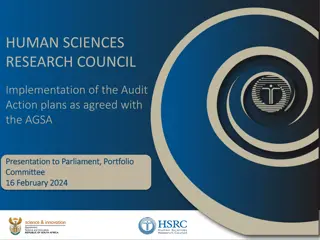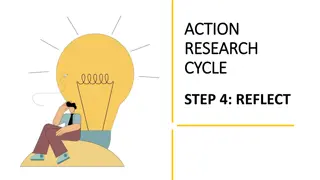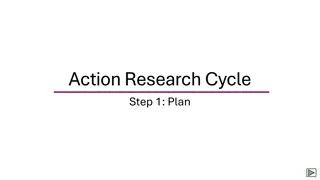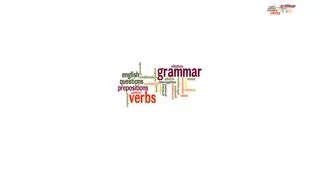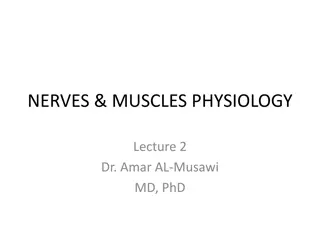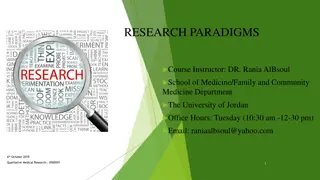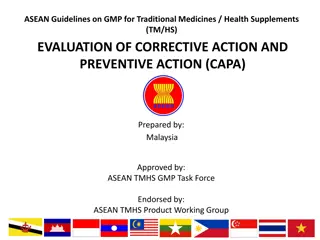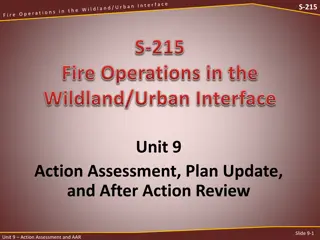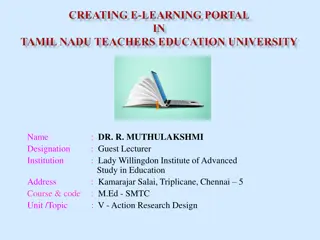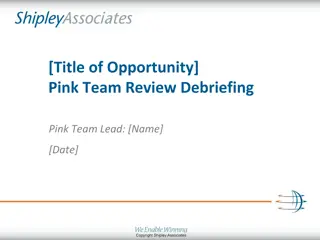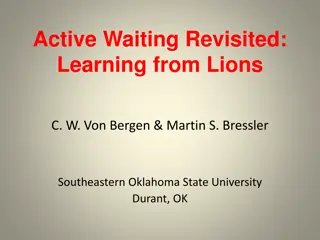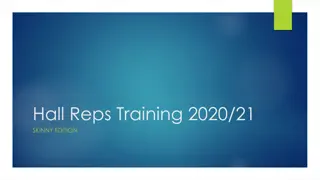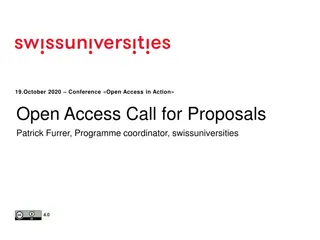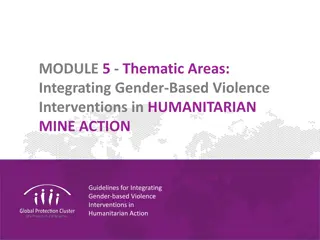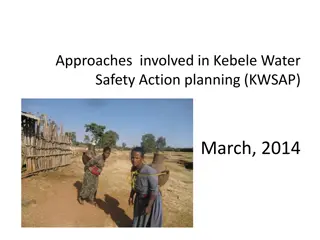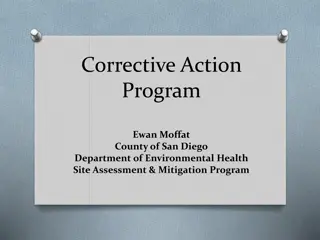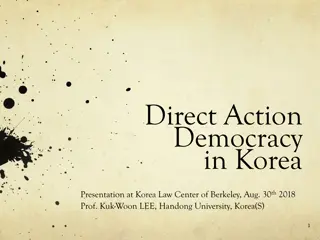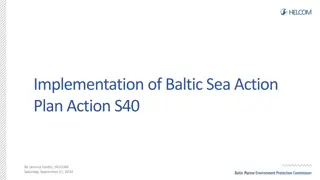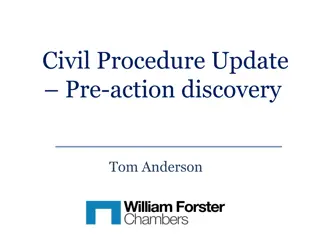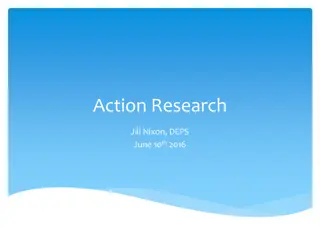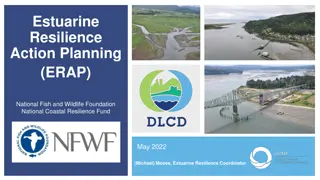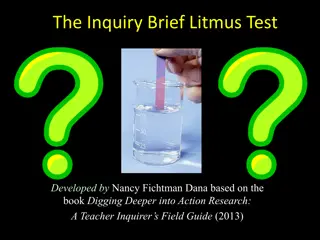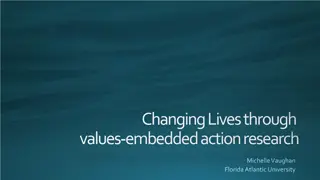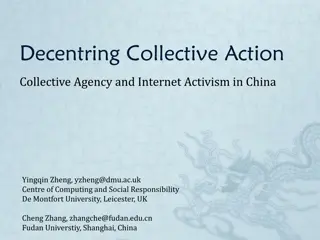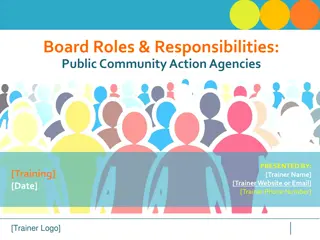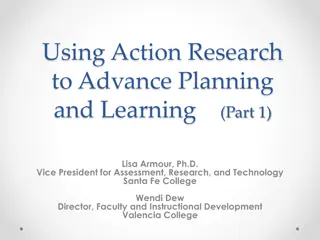Implementation of Audit Action Plans by HUMAN SCIENCES RESEARCH COUNCIL
This presentation to Parliament on 16 February 2024 covers the implementation of Audit Action Plans agreed with AGSA by HUMAN SCIENCES RESEARCH COUNCIL. It includes details on AGSA Recommendations, HSRC Commitments, Material Irregularity, and progress on the Audit Action Plan. The presentation outli
2 views • 16 slides
Combatting Postpartum Haemorrhage: Roadmap and Call-to-Action
Postpartum haemorrhage (PPH) is a significant global health concern, particularly affecting low- and middle-income countries. The need for a comprehensive roadmap and call-to-action arises from public health needs, innovation deficits, inconsistent guidance, implementation barriers, and the high mat
2 views • 17 slides
Guiding Reflection on Action Research Process
Explore prompts and steps to guide reflection on action research goals, results, beliefs, and experiences. Learn how to make conclusions, plan next steps, and improve the action research process. Reflect on challenges faced, successful strategies, and the impact of beliefs on decision-making in teac
4 views • 13 slides
Action Research Cycle Step 1: Plan and Implementing Research Questions
Action research involves identifying a problem, forming research questions, and creating a research plan. It aims to understand situations, evaluate, problem-solve, and generate new ideas. Defining a research topic is crucial, focusing on the rationale and relevance. Selecting manageable topics dire
8 views • 17 slides
UCC Research Support and Strategies Overview
UCC's Research Support, Policy & Strategy function, led by David O'Connell, PhD, provides comprehensive support for research activities at the university. The office manages research funding, monitors performance, and facilitates engagement with external stakeholders. UCC's involvement in Horizon Eu
3 views • 17 slides
Priority Activities and Action Plan for EW4All Infrastructure Commission: INFCOM-3 Session
The document outlines the priority activities and action plan for the Third Session of the Infrastructure Commission (INFCOM-3) within the Early Warnings for All initiative. It includes background decisions, a draft list of priority activities, and an action plan for contributions to the initiative.
5 views • 10 slides
Understanding Verbs: Action vs. State, Dynamic vs. Stative
Verbs are essential in sentences, describing actions or states of subjects. They can convey a sense of action like running or state like being. The distinction between dynamic (action) and stative (non-action) verbs is crucial, with dynamic verbs being used in continuous tenses and stative verbs des
0 views • 31 slides
Understanding Nerves and Muscles Physiology: Lecture Insights by Dr. Amar AL-Musawi MD, PhD
Delve into the intricacies of cardiac action potential, mechanism of action potential propagation, rhythmicity in excitable tissues, and the crucial concept of refractory period. Explore how voltage-gated channels influence the duration of action potential and learn about the spontaneous generation
0 views • 12 slides
Understanding Enzymes: Nature, Classification, and Mechanism of Action
Enzymes are biocatalysts synthesized by living cells. They are protein in nature and specific in their action. This article delves into the definition of enzymes, classification based on enzymatic action, enzyme class reactions, structure, and mechanism of enzyme action, highlighting how enzymes pla
1 views • 19 slides
Overview of Research Problem Identification and Formulation
Understanding the importance of defining a research problem, this content delves into the selection and formulation of research problems, the definition of a research problem, reasons for defining it, methods for identifying research problems, sources of research problems, and considerations in sele
1 views • 11 slides
Understanding Research Paradigms in Qualitative Medical Research
Delve into the world of research paradigms in qualitative medical research with a focus on the key differences between objective and subjective research, the meaning of research paradigms, components of research paradigms, types of research paradigms, and how paradigms guide the selection of researc
0 views • 42 slides
ASEAN Guidelines on GMP for Traditional Medicines: Evaluation of Corrective Action and Preventive Action
The ASEAN Guidelines on GMP for Traditional Medicines discuss the importance of Corrective Action and Preventive Action (CAPA) for maintaining quality in health supplements. CAPA involves identifying nonconformities, implementing solutions, and preventing future occurrences through continuous improv
1 views • 47 slides
Guidelines for Selecting Research Project Topics in Environmental Health
Research is crucial for addressing environmental health issues. Choosing a good research topic is the first step towards effective research. This paper discusses the meaning, characteristics, types of research, and the research process to help in selecting appropriate research topics. Understanding
0 views • 15 slides
Effective Action Assessment and Plan Update Strategies
Assessing the effectiveness of action plans is crucial for successful outcomes. This content provides insight into the key considerations for evaluating and updating action plans, including monitoring strategy validity, tactic effectiveness, communication adequacy, and more. Through a series of slid
0 views • 10 slides
Understanding Action Research in Education
Action research, popular in education, empowers practitioners to conduct research to enhance their teaching. It involves solving classroom problems through systematic actions, aiming for immediate solutions. The approach, pioneered by Kurt Lewin, applies scientific thinking to real-life issues, surp
0 views • 28 slides
Pink Team Review Debriefing Summary and Action Plan
Pink Team recently conducted a comprehensive review debriefing, highlighting key findings, detailed insights, recommendations, and action items. The team aims to enhance product quality by effectively relaying findings to the proposal team, implementing action items, and achieving substantive improv
0 views • 8 slides
Learning from Lions: Action, Procrastination, and Managerial Productivity
Every morning, the African gazelle and lion embody the essence of action and survival. While swift action is vital for success, procrastination and unproductive busyness can hinder progress. Understanding the balance between action and strategic waiting, as observed in lions, can enhance managerial
0 views • 17 slides
Hall Reps Training 2020/21 Skinny Edition Overview
Dive into the Hall Reps Training 2020/21 Skinny Edition to discover your role, support systems available, basics of safeguarding, and how to engage your hall with Action projects. Learn about the Action Committee, responsibilities, sub-sections of Action, and the schedule for action meetings. Get re
0 views • 21 slides
Understanding Affirmative Action: Origins and Criticisms
Affirmative Action was first proposed in the US by President John F. Kennedy in 1961 to combat discrimination. It aimed to prevent discrimination based on race, color, religion, sex, and national origin. This policy evolved into two forms: Strong Affirmative Action, which involves preferential treat
0 views • 39 slides
Open Access in Action Conference Overview
The Conference Open Access in Action on October 19, 2020, highlights the Open Science Programme, National Open Access Strategy, and Action Plan 2018-2024. It covers topics like Open Research Data, the future Strategy & Action Plan, and the drive towards free access to publicly funded research public
1 views • 29 slides
Guidelines for Integrating Gender-Based Violence Interventions in Humanitarian Action
This module focuses on integrating gender-based violence interventions into humanitarian mine action, providing guidelines, agenda, outcomes, and strategies for implementation. It emphasizes informing and supporting humanitarian actors to develop action plans and accountability measures to address g
0 views • 56 slides
Understanding Membrane Potential and Action Potentials in Excitable Cells
Membrane potential, resting potential, and action potentials play crucial roles in the functioning of excitable cells like neurons, muscle cells, and endocrine cells. Voltage-gated channels, depolarization, and repolarization are key processes involved in generating and propagating action potentials
0 views • 26 slides
Japanese Lesson Study: Enhancing Discipline Literacy in Science and Math
Study conducted at University of North Carolina focused on Japanese Lesson Study (LS) as a form of action research to improve discipline literacy in science and math. The LS method, a structured form of action research, involves specific team activities for research, decision making, implementation,
0 views • 25 slides
Approaches Involved in Kebele Water Safety Action Planning (KWSAP) - March 2014
The Kebele Water Safety Action Planning (KWSAP) initiative in Ethiopia's Amhara region aimed to enhance WASH performance by implementing a water safety plan approach. Key steps included training sessions, workshops, collaboration with stakeholders like WWT and KWT, risk assessments, action planning,
0 views • 10 slides
San Diego Environmental Health Corrective Action Programs Overview
In the County of San Diego, the Department of Environmental Health oversees Corrective Action programs for permitted facilities. This includes the Corrective Action Designation, SAM Programs, exclusions from Corrective Action, and sources of Corrective Action cases. The program covers releases from
0 views • 12 slides
Direct Action Democracy in Korea Presentation
A presentation by Prof. Kuk-Woon LEE on the concept of Direct Action Democracy in Korea, focusing on the Candlelight Rally of 2016-2017 and the need for action, deliberation, and decision-making in democracy. The presentation explores beyond the traditional dichotomy of direct and indirect democracy
0 views • 38 slides
Implementation of Baltic Sea Action Plan Action S40 Overview
The Baltic Sea Action Plan aims for a healthy Baltic Sea environment by implementing 199 actions and measures by 2030. Action S40 focuses on identifying fish species needing better data by 2024 and implementing measures for good environmental status. Programs are established to record and report dat
0 views • 12 slides
Pre-action Discovery in Civil Procedure: NT Supreme Court Rules
Pre-action discovery allows a party to obtain information from a potential defendant or non-party before commencing formal legal proceedings. The NT Supreme Court Rules Order 32 outline the procedures for pre-action discovery, including when there is reasonable cause to believe that relief may be ob
0 views • 13 slides
Understanding Collaborative Action Research in Education
Collaborative Action Research (CAR) is a systematic approach that combines action and reflection to bring about improvement in educational practices. It involves individuals or groups researching aspects of their own practice to facilitate progress and deeper understanding. The process includes defi
0 views • 11 slides
Estuarine Resilience Action Planning Overview
Estuarine Resilience Action Planning (ERAP) led by Michael Moses aims to enhance coastal resilience through community-driven, green infrastructure solutions. The three-part approach includes needs assessment, action analyses, and goal setting. The focus is on leveraging local partnerships and incorp
0 views • 6 slides
Machine Shop Safety Training and Equipment Usage
Understanding the importance of machine shop safety training is vital to prevent accidents. Familiarize yourself with terms like pinch points, reciprocating motion, transverse motion, cutting action, punching action, shearing action, and bending action to promote a safe working environment. Proper u
0 views • 40 slides
Explore the Inquiry Brief Litmus Test for Effective Action Research
Delve into the Inquiry Brief Litmus Test developed by Nancy Fichtman Dana for robust action research planning. Understand the key components of an inquiry brief and how it guides teams in their exploration of school learning capacity. Utilize the series of questions in the litmus test to refine your
0 views • 30 slides
Exploring Values-Embedded Action Research in Education
Dive into a comprehensive exploration of values-embedded action research in education, focusing on how personal values influence teaching practices and contribute to broader societal impacts. Discover the importance of understanding core values, creating valid accounts of living-theory research, and
0 views • 11 slides
Decentring Collective Action in Internet Activism: A Study on Collective Agency in China
This study explores the concept of collective agency in internet activism within the context of social movements in China. It discusses the role of ICT in virtual collective action, the structural preconditions for collective action, and the shift towards a more decentralized approach to collective
1 views • 16 slides
Climate Action Project - Inspiring Change in Schools
Urgent climate change issues were explored this week, emphasizing the importance of everyone's involvement. The impact of climate change on Earth and the significance of climate justice were highlighted. Climate anxiety and global solutions were discussed, emphasizing that personal actions can lead
0 views • 8 slides
Understanding Tripartite Board Operations in Public Community Action Agencies
This training material explores the roles and responsibilities of boards in public community action agencies, focusing on tripartite board operations. It covers topics such as authority delegation, funding requirements, and scenarios to help board members understand their roles better. Created in co
0 views • 14 slides
Enhancing Professional Development Through Action Research
Action research is a deliberate investigation approach that supports data-informed decision-making by faculty members in educational settings. It involves spiraling cycles of problem identification, systematic data collection, analysis, reflection, and data-driven action. This method encourages educ
0 views • 38 slides
Exploring Research Design and Funding Priorities in Northern Ireland
Dive into the world of research at the upcoming Application and Research Design Workshop scheduled for Friday, 28th May 2021. Discover the strategic priorities driving impactful research initiatives, learn about current research projects, funding processes, and collaborations. Explore the rich histo
0 views • 37 slides
Enhancing Learning Through Action Research and Living Educational Theories
Exploring the concepts of action research and living educational theories, this content delves into how individuals can improve their practices, understandings, and social formations in educational settings. It highlights the importance of individual explanations in shaping educational influences an
0 views • 10 slides
UNMAS Presentation on Mine Action and Humanitarian Assistance
In a presentation by Sarah Marshall, Chief of the Geneva Office at the United Nations Mine Action Service, the 55th Graduate Study Programme was discussed, highlighting the crucial role of UNMAS in saving lives, supporting peace initiatives, and managing explosive threats. The presentation covered U
0 views • 7 slides
